
views
- Avoid making comparisons, and instead focus on your own happiness and successes.
- Unfriend or unfollow people that you don't actually want to keep up with.
- Log out of your social media accounts for some time if you're struggling to balance your usage.
Managing How You Approach Social Media
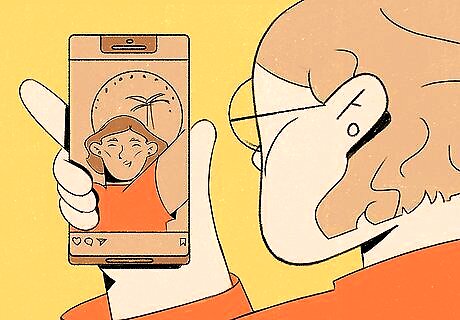
Acknowledge that social media profiles do not always reflect reality. It is easy to be envious when scrolling through Facebook and Instagram because people typically post about positive experiences in their lives. They will share pictures from a recent trip to the Caribbean or an amazing music festival, like Coachella. When you see these photos you need to keep in mind that this is not a depiction of regular life. Remember that these people also experience difficulties in their lives, just like you do, but they are not sharing these difficulties on social media. Additionally, the posts and photos that you see do not tell the true story of how the individuals can have these experiences. They may have their expenses paid by others, or they could be going into massive debt to maintain the lifestyle—things you might not want for yourself. Also a lot of photographs posted to social media are cropped or edited using special filters to make them look even more pleasing than the original photo. For example, photos can be brightened to make an overcast day appear sunny.

Avoid making comparisons. Most feelings of envy and jealousy that are associated with social media use are caused by comparing your actual life to the constructed lives of those you follow online. By constantly comparing your life to your friends, you may lose sight of the amazing things about your own life. Focus on what you have, not what your friends have. For example, someone you knew in grade school may have just gotten engaged to a successful, attractive lawyer, and you feel jealous because you are still single. Instead, you should focus on the great parts of your life, such as your friends, career, home, health, and family. Appreciate what you have and be grateful for your own achievements. When you feel yourself start to make comparisons, remind yourself that others are likely comparing themselves to you as well. While you may feel insecure that you didn't go on a great vacation this year or that you haven't found a partner, someone else might be thinking that your life is more carefree and exciting than theirs is or that your family appears to have a better relationship.

Post about good and bad things in your life. Try and provide a more well-rounded and realistic portrayal of your own life by sharing both positive and negative experiences on social media. This will allow your followers to view you as a more authentic person. Do not reinforce the cycle of jealousy on social media by making your life appear perfect. If more people begin to share negative experiences it may change the culture of social media. Social media jealousy will decrease if people share both positive and negative experiences. For example, you could post photographs that didn’t turn out well and use self-deprecating hashtags such as #selfiefail or #vacationfail, etc. You could post a social media rant about a negative experience you had that day, to demonstrate that your life is not always perfect and that you face stressful situations daily. Consider sharing hard times that you're experiencing rather than just a mistake or a bad day. You may find that your friends can provide you with great support and advice during your time of need. Examples of things to share include a recent job loss, an illness, or the end of a relationship. Just remember to be tactful when sharing information that involves others. Try to avoid oversharing. When posting about negative experiences on social media, try to include something meaningful or helpful. Share what you've learned from that experience or how it helped you grow as a person, or how you plan to recover from it. That way you can help others who may be going through the same experience, and you won't bum your friends out by being too negative.
Engaging in Healthy Social Media Relationships
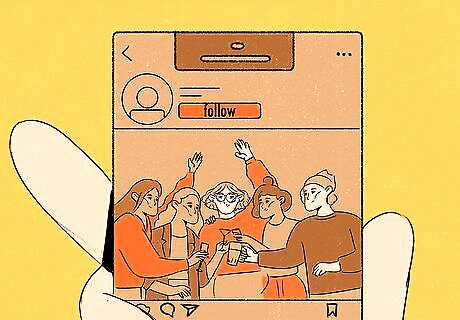
Connect with actual friends on social media. Most people use social media platforms, such as Facebook, to stay in touch with people. Although this can be an amazing tool, it can also lead to social media jealousy. For instance, you may follow multiple people who you went to high school or even grade school with, but haven’t actually seen in years. It is more likely that you will feel jealous looking at posts by former friends and acquaintances than actual friends. Only follow true friends on social media because this will give real-life context to some of their posts, reducing instances of jealousy. If someone becomes upset that you do not want to be friends on social media, then you'll know you made the right choice. You don't have to explain your choices to anyone. Focus on what's best for you. You are more likely to be happy with the achievements of a close friend than a one-time acquaintance.
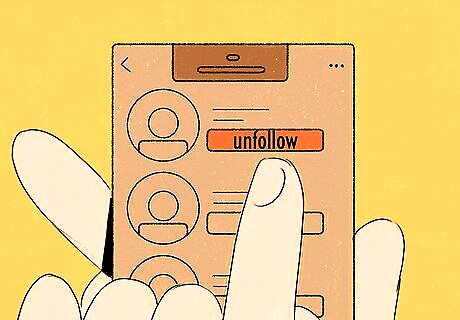
Purge your social media accounts. Different social media platforms are used for different purposes. For instance, Facebook is typically used as a way to stay connected with friends. Alternatively, Instagram and Twitter can be used as a way to follow existing friends and make new connections. Regardless of the platform, you should go through the list of people you follow and delete or unfollow anyone who makes you feel worse about yourself, or any brands or companies that make you envious of their products and consequently inadequate. Never feel guilty or ashamed for unfollowing or deleting someone, even if that person is well-meaning, such as a friend who shares a lot of "inspiration" posts. You are making choices that will help you simplify and feel better, and that has nothing to do with them as a person. For instance, many companies, brands, and designers have Instagram accounts and will advertise their merchandise by posting professional photographs. These types of posts can cause you to be envious of material goods and make you feel as though your own possessions are not “good enough” or “cool enough.”
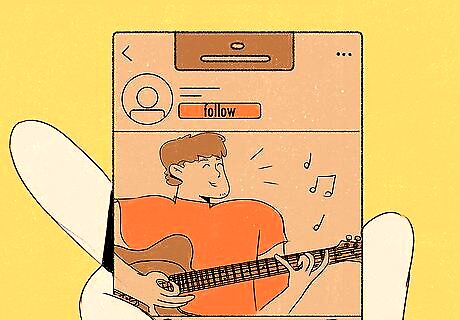
Follow new accounts that inspire you. Another way to avoid social media jealousy is to follow people that inspire you, rather than people who you feel competitive with. For instance, you may want to follow creative people who work in a completely different field than you. This way you may not compare your life to theirs, because you lead different lives, but you can find inspiration through their creativity and work ethic.
Distancing Yourself from Social Media
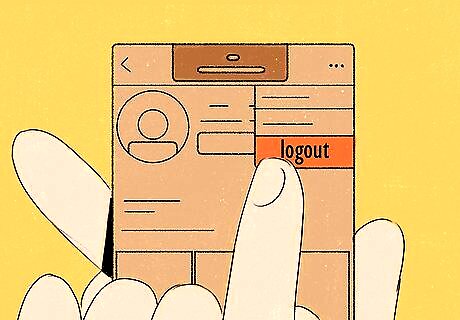
Log out of your social media accounts. If you are suffering from social media jealousy, it is probably a good idea to reduce the amount of time you spend scrolling through social media feeds. One easy way to do this is to log out of your social media accounts. This will make it more difficult to access social media. Alternatively, you could delete social media apps, such as Facebook and Pinterest, from your phone or tablet. This way if you only have five minutes to kill, it will be more difficult to spend that time surfing social media sites.

Set goals for how you'll use social media. Plan how you'll use social media in a way that supports your mental health. For example, designate a time to catch up with friends and family and set a time limit for how long you'll spend on social media each day. Choose a time of day when you're less likely to get derailed by social media or depressed about what others are doing. For example, don't start scrolling through social media when you're bored at work or school because it may cause you to spend more time scrolling. Additionally, you may feel worse about yourself since you're not having a fulfilling work day. Try a time that precedes something you enjoy. For example, check your social media accounts before you head to your dance class at the gym or to meet a friend for coffee. You'll be more likely to stick to your time limit and have something fun going on in your own life.

Unplug from social media. If you are beginning to feel depressed as a result of social media jealousy and you constantly find yourself comparing your life with people on your Facebook, Pinterest, Instagram, or Twitter accounts, you should unplug from social media. This will allow you to focus more on your own life. You may find that you don’t even want that handbag your friend posted last week, and your small apartment is the perfect size. If you are not bombarded with images of people living amazing lives, you will begin to appreciate the things that you have in your own life. Make a habit of identifying things to be grateful for each day. Consider incorporating them into your journal, prayers, meditation, or therapy. You can also post a gratitude list in your home. If you're not sure if you're feeling depressed because of social media, take time to ask yourself how you feel after you use it. Ask questions like, "How do I feel about my life right now?" and "Do I feel satisfied with myself?" If you're feeling down, see if it traces back to social media. Try journaling your thoughts to see if you're quietly comparing yourself to the people you follow.

Choose to build relationships without social media. This may sound old-fashioned, but one way to manage social media jealousy is to build and develop relationships without using social media. Getting together with friends face-to-face will help you get to know what is really happening in their day-to-day lives. You are more likely to feel compassion for your friends if you develop real and meaningful relationships. Try these tips to maintain friendships without social media: Call or text a friend to make plans, rather than send a message through a social media platform. Get together with a friend to show them photos of your latest vacation, rather than just posting the images online. Meet with a friend to congratulate them on their new job, engagement, wedding, or birth of a child rather than just “liking” or commenting on a social media post. If you have friends or family who live out of town, consider using Skype or FaceTime to have face-to-face visits or communicating via telephone.




















Comments
0 comment